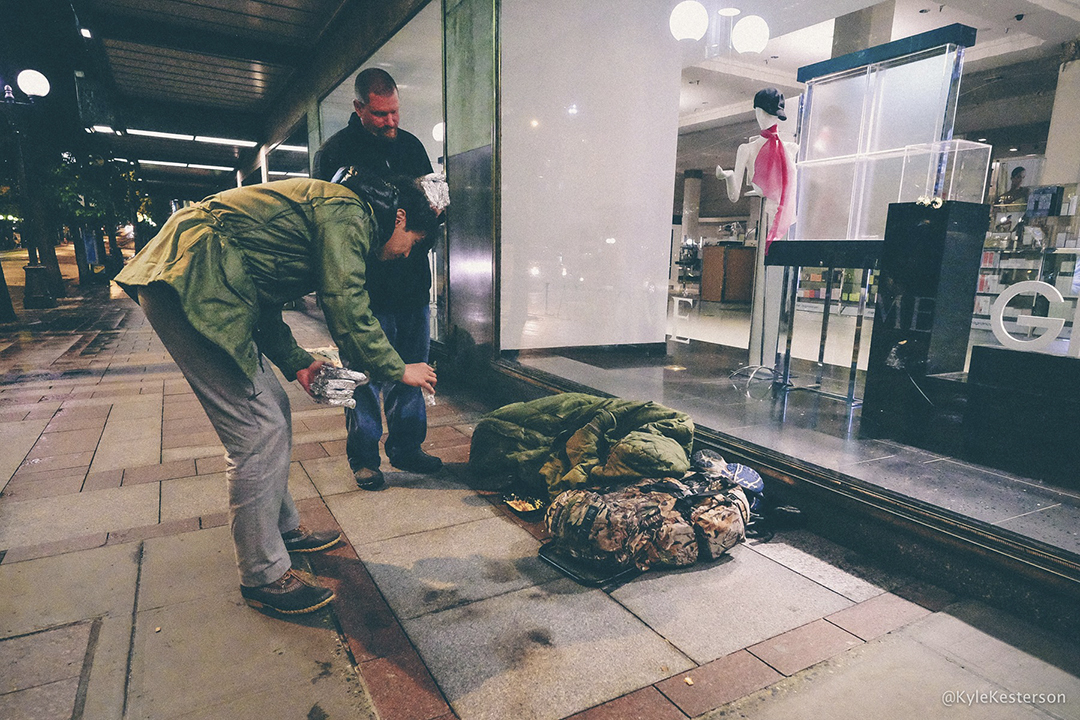It’s no secret that homelessness is a tremendously difficult circumstance to escape for those experiencing it. And for more fortunate Seattleites who want to help people living on the streets, it’s hard to know how to start. The scale of the homelessness crisis is immense, and the economic and social conditions that have so many thousands of our neighbors sleeping in cars, doorways, and tents are complex. No single person can reinvent our housing system and fix the problem, but what can a single person actually do?
The easiest way to help is to give cash to folks on the street. But while five dollars can help in a tight spot, it’s a contribution to someone’s life that most likely will only last for a day and might not even speak to their most pressing needs. Those in need often ask for money because that is the most seamless transaction two strangers can make, but what if what they really need is a sleeping bag or dry socks and they don’t have the transportation or social capital to make such a purchase. These are the kinds of donations that can make a lasting impact. They are also the focus of a new service called WeCount.
A free peer-to-peer sharing service, WeCount aims to alleviate homelessness by doing something simple: giving people experiencing homelessness what they need when they ask for it. The online platform allows a person experiencing homelessness to request a certain item—like a backpack, sleeping bag, or white collar clothes for a job interview—from a list of useful items compiled by social service workers and members of the homeless community. Donors can view outstanding requests on the platform, make a purchase or donate gently-used item, and take the requested item to a distribution site run by trusted social service providers like Downtown Emergency Services Center or Union Gospel Mission.
After a donor has delivered the item to a service provider, the person in need will be notified that the request has been fulfilled through email, text message, or the next time they log in to the WeCount platform. After a trip to the social service provider, the person in need is a little less in need. But they aren’t the only one who gets something from the interaction.
“We try to make WeCount so that it’s a value proposition for both groups,” says Graham Pruss, an activist who developed the service with tech executive Jonathan Sposato. “We turned this into something that is fun and engaging for people, that is easy to use, and really can appeal to the masses so that we’re suddenly turning on everybody to be an agent of change within the community. People can get involved with something so simple. It can be a revolutionary catalyst for change.”
Before building the service, the founders spent months talking with people experiencing homeless and the people who help them, trying to leverage Seattle’s tech industry to come up with a project that would make a real, immediate impact and drive meaningful activism for people outside the homelessness community. The result was both simple and revolutionary.
The platform was designed for universal access, allowing people to easily call up the service through mobile phones, public libraries, and social service agencies. And while WeCount relies on other nonprofits as intermediaries, the platform effectively provides direct giving from person to person, making it the first successful peer-to-peer service to be used by a nonprofit.
Pruss, a longtime advocate for the homeless community who has experienced homelessness himself, says he hopes that WeCount will spur donors to engage more deeply with homelessness on a regular basis. He says that by having donors drop off their items with social service providers, donors themselves will have the opportunity, when they stop in, to form a relationship with the provider and the people who utilize its services. And, when a recipient picks up s donation, WeCount will allow the recipient to send a thank you note to the donor—which will hopefully move the donor to keep donating, or even volunteer.
WeCount also provides an opportunity for the tech community to make good on its larger promise of positive social change. Cofounder Jonathan Sposato, a noted tech investor and the CEO of GeekWire and PicMonkey, is generally dubious of that larger promise, saying that tech companies develop “a lot of stuff that arguably doesn’t matter.”
“I challenge the tech community to think much more and much harder about the homeless community,” he says. “I think that issue is a moral issue—I think not thinking about it is a moral failure.”
WeCount is an attempt to address that failure using the same underlying peer-to-peer technology that has disrupted the hotel and taxi industries. Sposato and Pruss have similarly ambitious plans to disrupt homelessness everywhere. As soon as the platform is perfected in Seattle and King County, WeCount plans to develop donation site partnerships with social service agencies across the country, and make the technology as ubiquitous as the social media sites it draws from.
It seems imperative to point out that the moral failure to address homelessness is hardly unique to the tech industry. It’s something that all of us fortunate enough to live in a warm home all do to some degree. The promise of WeCount is that perhaps, if we all do some small kindness to help our fellow travelers sleeping in cars, doorways, and parks, we can together form a safety net that will get them inside, safe, and warm.




